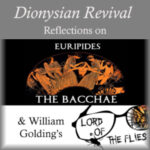Reflections on the Poetry of T S Eliot
Reflections on T S Eliot’s Four Quartets
Even though the poet Allen Tate called our era “the age of Eliot”, Eliot’s poetry has been as little assimilated by the 20th and early 21st century as was Dante’s by the 14th and 15th. This 8 part series explores what many believe to be Eliot’s poetic masterpiece.
Reflections on The Waste Land
“To readers who want not amusement or magic, but poetry, and who want to know what poetry can be, if it is to be neither of these things, The Waste Land supplies an answer. And by reflecting on it we can perhaps detect one more characteristic which art must have, if it is to forgo both entertainment value and magical value, and draw a subject matter from its audience themselves. It must be prophetic. An artist must prophesy not in the sense that he foretells things to come, but in the sense that he tells his audience, at risk of their displeasure, the secrets of their own hearts.”
– R. G. Collingwood
Reflections on Ash Wednesday
This 3 part series explores Eliot’s poetic works produced after The Hollow Men and before The Four Quartets. Bailie suggests that Ash Wednesday is The Waste Land “contextualized” – a Lenten journey through the desert leading to the Promised Land reflecting Eliot’s own journey into an affirmed Christian faith.
Reflections on Hollow Men
When love begins to sicken and decay,
It useth an enforced ceremony.
There are no tricks in plain and simple faith;
But hollow men, like horses hot at hand,
Make gallant show and promise of their mettle;
But when they should endure the bloody spur,
They fall their crests, and, like deceitful jades,
Sink in the trial. – Julius Caesar Act IV scene ii
Eliot in his earlier poetry had described a world where love had begun to ‘sicken and decay’. In the Hollow Men he is trying to re-appropriate the ritual dimension of life and to wrestle with the proposition that such a re-appropriation is no longer possible or perhaps even legitimate. Eliot seems to have arrived at an impasse in his life which was both poetic in terms of his literary career, and religious in terms of his spiritual development.
Reflections on T S Eliot’s Early Poems
In this series on TS Eliot’s Early poetry Gil Bailie explores The Love Song of J. Alfred Prufrock, Cousin Nancy, Aunt Helen, Sweeney Among the Nightingales, and Gerontion.
Reflections on Murder in the Cathedral
In Murder in the Cathedral T.S. Eliot is exploring the role of the church in modern society. In these reflections, Gil Bailie asks the question, “What is the church for?”
As a social institution acting in history the church is fallible and bears the same limitations as all social phenomena. It has served worldly interests, has soiled its hands, has passed off the temporal for the eternal. In this sense one may await and demand from the historic church repentance, the recognition of its sins and of its partial betrayal of Christ. – Nicolai Berdyaev
Knowing that the church is a far cry from what it ought to be, is itself a far cry from knowing what it ought to be.



